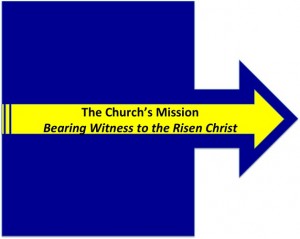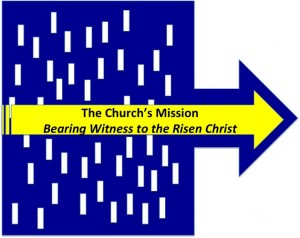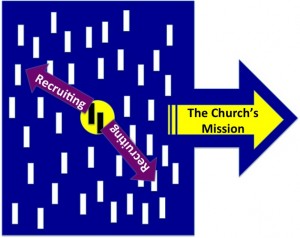1 Now in these days when th e disciples were increasing in number, a complaint by the Hellenists arose against the Hebrews because their widows were being neglected in the daily distribution. 2 And the twelve summoned the full number of the disciples and said, “It is not right that we should give up preaching the word of God to serve tables. 3 Therefore, brothers, pick out from among you seven men of good repute, full of the Spirit and of wisdom, whom we will appoint to this duty. 4 But we will devote ourselves to prayer and to the ministry of the word.” 5 And what they said pleased the whole gathering, and they chose Stephen, a man full of faith and of the Holy Spirit, and Philip, and Prochorus, and Nicanor, and Timon, and Parmenas, and Nicolaus, a proselyte of Antioch. 6 These they set before the apostles, and they prayed and laid their hands on them. 7 And the word of God continued to increase, and the number of the disciples multiplied greatly in Jerusalem, and a great many of the priests became obedient to the faith.
R. Kent Hughes has told one of the most heartbreaking stories I think I have ever heard about church conflict.
When a certain Dallas church decided to split, each faction filed a lawsuit to claim the church property. A judge finally referred the matter to the higher authorities in the particular denomination. A church court assembled to hear both sides of the case and awarded the church property to one of the two factions. The losers withdrew and formed another church in the area.
During the hearing, the church courts learned that the conflict had all begun at a church dinner when a certain elder received a smaller slice of ham than a child seated next to him. Sadly, this was reported in the newspapers for everyone to read. Just imagine how the people of Dallas laughed about that situation![1]
I also have in my files an Associated Press article about a conflict in a church in Spartanburg, SC, that ended up before a judge some years ago. His response to the case was most interesting.
Magistrate tells church, pastor to settle their own dispute
The Associated Press
Spartanburg, [SC] – A magistrate told church members and the pastor they are trying to fire that he may not have the authority to settle their months long dispute and urged them to resolve their differences out of court.
The dispute involves Foster Chapel Baptist Church and its efforts to oust its pastor, the Rev. Douglas E. Dennis. On several occasions, the church has voted to fire Dennis, but he has refused to stop representing himself as pastor or to leave the parsonage.
On Thursday, Magistrate Robert Hall told about 60 church members crowded into a Spartanburg County courtroom for Dennis’ eviction hearing that they need to settle the issue themselves.
“I’m asking you as a judge, and maybe I shouldn’t, but I’m asking you as a Christian, to resolve this matter,” Hall told the crowd, which included Dennis’ supporters and church supporters…
Dennis refused to comment on whether he things the dispute is resolvable. “I’ll be back in the pulpit on Sunday. That’s all I can say.” he said.[2]
When cannot help but be struck by this image: a judge pleading as a Christian with a church to please resolve their conflicts like Christians without the involvement of the court. Implicit in his plea were the ideas (a) that the Church should resolve its own conflicts and (b) that the Church actually can resolve its own conflicts.
Both of these ideas are true, as the Church’s example in Acts 6 makes clear.
Conflict In the Church is Inevitable
Having overcome the first bouts of persecution as well as an egregious attempt on the parts of two members to live deceptively in the midst of the Church (Ananias and Sapphira), the body of believers now must cross the bridge of conflict.
1 Now in these days when the disciples were increasing in number, a complaint by the Hellenists arose against the Hebrews because their widows were being neglected in the daily distribution.
“A complaint…arose.” That is saying a lot by saying a little. For our purposes, let us not miss the obvious point: conflict in the Church is inevitable. It will happen.
Everything is going well. The Church is growing. The Church has successfully cleared some dangerous hurdles. Then conflict comes. It always comes. Why? Because the Church consists of human beings trying to do life together in the Lord. As human beings, we conflict.
What was the nature of the conflict? Well, the immediate cause was the fact that a group within the church, the Hellenists, felt that another group, the Hebrews, were receiving preferential treatment. Before we consider the specific complaint, let us understand these terms: Hellenists and Hebrews.
At this point in the life of the Church, centered in Jerusalem, we are not yet dealing with Gentile converts. We are dealing with Jews who had embraced Jesus. And in the Church there were two general categories of Jews. There were the Hebrew Jews. These were the Jews who were from the area of Palestine and who spoke Aramaic and Hebrew. The other Jews were Hellenists. This likely means that they were Jews from the Diaspora, that is, the scattering across the nations of the Jews from earlier years and persecutions and exiles. What likely happened here is that many Jews who had been scattered over other lands decided, perhaps in their waning years, to return to the promised land. Perhaps there were nostalgic reasons for this. Perhaps there were spiritual reasons for it. Perhaps they simply wanted to be buried in the land of their fathers. Regardless, they came home. They were called Hellenists because they had lived so long outside of Palestine that they had, to a certain extent, been Hellenized. Hellenization refers to the historical phenomenon of the spread of Greek culture throughout the world through the conquests and intentional Hellenizing efforts of Alexander the Great. Thus, these Hellenist Jews spoke Greek.
You can imagine how the Hebrew Jews thought of themselves as purer and truer Jews than the Hellenist Jews who spoke this foreign language of the pagans. But here is the rub: in the Church Hebrew Jews and Hellenist Jews had both come to know Jesus, had both been born again, and had both been brought into the Church. So what you have in the early Church are tensions between these differing groups of Jewish converts.
It is not surprising, then, that the Hellenist Jews, those from “the outside,” would be the ones who felt slighted. Slighted how? Interestingly enough, they felt slighted about food. Hear Luke’s description again.
1 Now in these days when the disciples were increasing in number, a complaint by the Hellenists arose against the Hebrews because their widows were being neglected in the daily distribution.
Do you see? The Hellenist Jewish converts felt that their widows, the Hellenist widows, were not being properly cared and provided for when the food was distributed to help the widows and the poor every day. They felt that the Hebrew widows were receiving disproportionately more food than the Hellenist widows. And this, of course, was seen to be unfair.
What was this daily distribution of food? It was likely a hold over from the synagogue practice of the Jews. William Barclay explains:
In the Synagogue there was a routine custom. There were officials who were known as receivers of alms. Two collectors went round the market and round the private houses every Friday morning and made a collection partly in money and partly in goods for the needy. Later in the day this was distributed. Those who were temporarily in need received enough to enable them to carry on; and those who were permanently unable to support themselves received enough for fourteen meals, that is enough for two meals a day for the ensuing week. The fund from which this distribution was made was called the Kuppah or Basket. In addition to this there was a house-to-house collection made daily for those in pressing need. This was called the Tamhui, or Tray. It is clear that the Christian Church had very wisely taken over this custom.[3]
So these Jews would have been familiar with the people of God providing for the daily needs of those who could not feed themselves. Remember, though, that these Jews who embraced Jesus would have been cast out of the synagogues and removed from the benevolence lists. Even so, the Church now saw it as their responsibility to care for those in need, so they picked up the practice of the Kuppah and the Tamhui and carried it on, this time with the loving words of Jesus ringing in their ears.
Even with these kindly benevolent intentions, complaints arose. I repeat: conflict is inevitable. The question is not, “Will the Church face conflict?” The question is, “How will the Church respond when it faces conflict?”
It is a question the early Church had to ask themselves. It is a question we must ask ourselves as well. Fortunately, we have a beautiful example of conflict rightly handled and responded to in our text this morning.
Resolution Of Conflict Comes When People Who Are Looking at the Bigger Picture of the Church’s Mission Help Those Caught in the Smaller Picture of the Conflict to Resolve it for the Good of All
The apostles learn of this conflict. It finally reaches their ears. “Some folks are unhappy,” they are told. Their response is most interesting. Listen closely.
2 And the twelve summoned the full number of the disciples and said, “It is not right that we should give up preaching the word of God to serve tables. 3 Therefore, brothers, pick out from among you seven men of good repute, full of the Spirit and of wisdom, whom we will appoint to this duty. 4 But we will devote ourselves to prayer and to the ministry of the word.” 5 And what they said pleased the whole gathering, and they chose Stephen, a man full of faith and of the Holy Spirit, and Philip, and Prochorus, and Nicanor, and Timon, and Parmenas, and Nicolaus, a proselyte of Antioch. 6 These they set before the apostles, and they prayed and laid their hands on them.
What immediately jumps out is the fact that the twelve felt that the Church was capable of solving its conflicts. “We can fix this!” they seem to be saying. Tellingly, they gathered “the full number of the disciples” to address this issue. Conflict is always a Church issue because conflict always has the potential to spill over into the Church at large.
Writing in the 16th century, the German Lutheran Johann Spangenberg perhaps unfairly saw in the original complaint of these Hellenists “no little grumbling, but rather a poisonous rage, a barbed cursing and berating against the deep apostles.” I say this is perhaps unfair because there is no evidence that the complaint came from any kind of demonic rage or that it was unjust. It appears rather to have been precisely the kind of conflict that arises when Christians try to do life together. Spangenberg went on to point out that there would have been no conflict in the early Church had God “punished such grumblers a he punished the children of Israel with fiery and poisonous snakes in the wilderness…or as Ananias and Sapphira died a sudden death. But,” he observed, “God now prefers to use his lovingkindness rather than his wrath.”[4]
That is a jarring but very true observation. God could have just struck everybody dead like he did Ananias and Sapphire. But, of course, he does not do this. What is happening here is very different from what was happening with Ananias and Sapphire. Here we find normal conflict. With Ananias and Sapphira we found intentional deceitfulness. But Spangenberg’s point is a good one. God does not allow us to to do an end run around conflict resolution by His simply killing people who are in conflict. No, the Church must learn to live together. The Church must learn how to get along. The Lord knew that the Church needed to cross this bridge sooner rather than later since conflict is an inevitable part of the Church’s shared life.
When we look at the Apostles’ instructions on how this conflict was to be resolved, we discover a crucial truth: resolution of conflict comes when people who are looking at the bigger picture of the church’s mission help those caught in the smaller picture of the conflict to resolve it for the good of all.
Let us take a moment and think through how conflict happens in a Church. Start at the beginning. The Lord establishes a church and gives it a mission.
This mission is unchanging and we have seen it amply illustrated here in the first chapters of Acts. The mission of the Church is to bear witness to the resurrected Christ in word and deed and reflect His presence among His people.
Then, into this Church with a mission, God draws people.
People come in. He grows His Church. And, perhaps for a while, the people who make up the Church are united around God’s mission and God’s purpose. God’s mission for the Church emboldens followers of Jesus to attempt great things for the Kingdom of God.
However, inevitably, people being people, something unfortunate happens along the way: two people within the church conflict.
Who knows why? It could be for an important reason. It could be for a petty reason. It could have to do with present perceived wrongs. It could have to do with past perceived wrongs. It may arise from personality conflicts. It may arise from words carelessly or deliberately spoken. It may arise just from two people who rub each other the wrong way, who irritate each other, perhaps, whose personality differences finally bubble over in conflict.
So two people enter into their own personal arena of conflict within the Church. The longer they do this, the more they begin to drift from God’s mission for the Church because the longer they dwell in the arena of conflict the bigger it gets. And do you know how it gets bigger? It gets bigger through recruitment. Yes, recruitment.
When human beings conflict, they naturally and instinctively want to bolster the solidity and assumed righteousness of their own positions by bringing others into the sphere of conflict, but on their side. So they recruit. They recruit by reaching out to others, initially those in their own circle of friends, telling them their particular version of the conflict, playing up the perceived faults of the other and downplaying any possible faults in themselves in the process. People recruit in conflicts by offering narratives of the situation that their friends, already predisposed to believe and defend them, will find reasonable.
What is significant here is that both people are doing this. Both people are telling their friends their versions of the story. Now, some of these other folks will politely listen, offer words of encouragement, but refuse to enter into the sphere of conflict. Maybe this is because they are smart enough to know that there is always another side. Maybe this is because, even though they love the friend who has reached out to them with their version of the story of the conflict, they know their friend has weaknesses, they know their friend may actually be wrong in this situation. Who knows?
Regardless, human nature being what it is, there are lots of folks who will enter into the conflict.
They will enter in the background, ideally, as gossip partners or verbal instigators, a cheering section, if you will. After a season of recruiting, the two people have effectively built networks of mutual affirmation for their respective versions of what is happening in the conflict. And, of course, in any person’s version of a conflict, they are right and the other is a blithering idiot who may just be evil. Now, this is potentially dangerous. In fact, church splits occur when the respective networks on either side of a conflict grow so large that they divide the Church.
But here is the thing, it is not the mere forming of sides, even large sides, that ultimately split churches. It is the increasing diminishment of the central divine mission of the Church that occurs when the localized mission of the opponents grows larger and larger that ultimately splits the Church. Put another way, as the goal of winning the conflict grows larger, God’s goal for the Church, His mission for the Church to be a proclaiming, witness-bearing, Christ-demonstrating body grows smaller. The mission of God for the Church becomes effectively eclipsed by the mission of those in the conflict to win.
How, then, is conflict resolved? I repeat: resolution of conflict comes when people who are looking at the bigger picture of the church’s mission help those caught in the smaller picture of the conflict to resolve it for the good of all. Resolution comes when mature Christians who have not lost sight of the central mission of the Church call those embroiled in conflict to put their smaller mission of conflict-victory alongside the larger God-given mission of witness bearing so that they can see how very small and, at times, how very petty the conflict and the individual agendas that comprise that conflict really are.
What does this look like? It looks like this: “Hey man, can we talk for a minute? Listen, I know that the two of you are at odds, have gotten your wires crossed, and are in conflict. I don’t know who’s right and who’s wrong. My guess is, you probably both are partially right and partially wrong. That’s how these things usually are. But as your friend, can I ask you to do something for me and for the Church at large? Can I ask you to remember who we are and what we’re here for? I’m afraid that this whole situation has become so big and so deep and so ugly that you guys are forgetting that people around us are lost and going to hell and they need a Church that is united in the gospel and speaking together. Can I just say to you that whatever you stand to gain in this conflict if you win does not come close to matching what we are all going to lose if this thing isn’t resolved, and resolved quickly? So please, take a moment and think about this. God is wanting to do something here. God is wanting us to do something here. This conflict, no matter how legitimate the concerns that lie behind it might be, really does threaten the entire body. Let’s all humble ourselves, apologize, forgive, and come back together around Christ.”
Please note that what I am calling for here is not a burying of the problem without resolution. In fact, in our text this morning, they did take practical, wise steps based on solid judgment and wisdom to resolve the problem. No, what I’m calling for here is for all of us to allow the greater mission to which we have been called to help us keep our smaller issues and conflicts in perspective. This approach will call us to humility, a hesitancy to recruit others to our cause (because we will not want to spread the conflict), and a desire to resolve the issue quickly.
I would propose to you that we see precisely this in our text this morning. Listen again.
2 And the twelve summoned the full number of the disciples and said, “It is not right that we should give up preaching the word of God to serve tables. 3 Therefore, brothers, pick out from among you seven men of good repute, full of the Spirit and of wisdom, whom we will appoint to this duty. 4 But we will devote ourselves to prayer and to the ministry of the word.” 5 And what they said pleased the whole gathering, and they chose Stephen, a man full of faith and of the Holy Spirit, and Philip, and Prochorus, and Nicanor, and Timon, and Parmenas, and Nicolaus, a proselyte of Antioch. 6 These they set before the apostles, and they prayed and laid their hands on them.
Now notice a few important things:
- The Apostles clearly saw the potential for specific conflicts within the Church to affect adversely the entire Church. Thus, verse 2, they “summoned the full number of the disciples.”
- The first thing they did was put the localized conflict beside the God-ordained mission of the Church to create perspective. Thus, verse 2b, “It is not right that we should give up preaching the word of God [i.e., the mission of the Church] to serve tables [i.e., the arena of the specific conflict].”
- They then called upon the entire Church to be part of the solution. Thus, verse 3, “Therefore, brothers, pick out from among you seven men of good repute, full of the Spirit and of wisdom, whom we will appoint to this duty.”
- They offered wise, practical steps for conflict resolution, which the Church embraced. Thus in verse 5 we see the seven men mentioned. Interestingly, all of them have Greek, Hellenistic names. Do you see the wisdom of this? They appointed people from the offended party and gave them leadership, thereby bringing them into leadership and responsibility bearing and communicating to the Hebrew believers that these Hellenist believers were indeed full, equal members of the Church.
What a wise, careful, beautiful example of conflict resolution!
A Church That Commits Itself to Peacemaking and Conflict Resolution is a Blessed and Healthy Church
And what is the result of a Church committing itself to peacemaking and conflict resolution?
7 And the word of God continued to increase, and the number of the disciples multiplied greatly in Jerusalem, and a great many of the priests became obedient to the faith.
Brothers, sisters: peace is a choice.
Peace is a choice. And it is a choice that pays great dividends. The Church embraced an intentional process of peace and “the word of God continued to increase,” and they grew, and even “a great many of the priests became obedient to the faith.” This is what happens when a Church resolves conflict and when individual believers resolve conflicts rightly.
The Apostles and the early believers have shown us how to resolve conflicts and maintain peace. I would submit to you that conflict can only grow unchecked if we refuse to follow their lead.
The Body of Christ is crucial to the advancement of the Kingdom of God in the world. This is why Christ created a Church. We are the stewards and heralds of the amazing truth that the Jesus who was crucified and buried is now alive.
Do not…do not…allow unresolved conflicts, hurt feelings, disgruntled attitudes, and a refusal to embrace intentional peacemaking with others and ourselves derail the grand adventure to which we have been called!
[1] R. Kent Hughes, Acts. (Wheaton, IL: Crossway Books, 1996), p.76.
[2] The State Newspaper, Friday, June 2, 2000 https://www.thestate.com/headlines/ regiondocs/02churchsc.htm
[3] William Barclay, Acts. The Daily Study Bible. (Edinburgh: The Saint Andrew Press, 1969), p.50.
[4] Esther Chung-Kim and Todd R. Hains, eds. Acts. Reformation Commentary on Scripture. New Testament, vol.VI. Timothy George, gen. ed. (Downers Grove, IL: InterVarsity Press, 2014), p.73.









